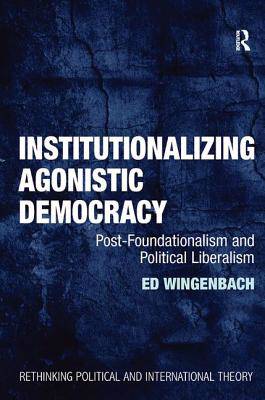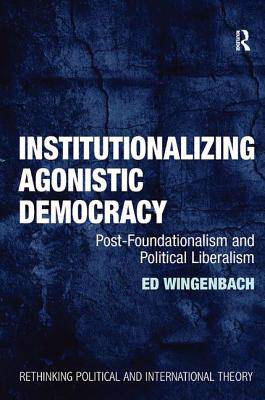
Door een staking bij bpost kan je online bestelling op dit moment iets langer onderweg zijn dan voorzien. Dringend iets nodig? Onze winkels ontvangen jou met open armen!
- Afhalen na 1 uur in een winkel met voorraad
- Gratis thuislevering in België vanaf € 30
- Ruim aanbod met 7 miljoen producten
Door een staking bij bpost kan je online bestelling op dit moment iets langer onderweg zijn dan voorzien. Dringend iets nodig? Onze winkels ontvangen jou met open armen!
- Afhalen na 1 uur in een winkel met voorraad
- Gratis thuislevering in België vanaf € 30
- Ruim aanbod met 7 miljoen producten
Zoeken
€ 182,45
+ 364 punten
Omschrijving
The first book length study of agonism as a mature account of democratic politics, Institutionalizing Agonistic Democracy provides a lucid overview of agonistic democratic theories and demonstrates the viability of this approach for institutional politics. Situating agonistic democracy within and against debates about radical democracy, foundationalism, liberal democracy, and pluralism, Institutionalizing Agonistic Democracy engages the texts of Mouffe, Connolly, Ranciere, Tully, Honig, Owen, and others to fully map the contours of agonistic democratic theories. Organizing this diverse literature into a coherent typology enables sophisticated analysis of the assumptions, distinctions, and aspirations of the often conflicting theoretical positions gathered within the constellation of agonistic democratic theory. Using this framework to explore the concrete institutional possibilities appropriate to agonistic democracy, Wingenbach argues that a modified version of Rawlsian political liberalism describes the institutional conditions most likely to sustain agonistic political practices. Once shorn of metaphysical commitments and detached from aspirations to consensus, political liberalism offers a contingent and historically viable framework within which agonistic contestation can occur. Such a reinterpretation of Rawls produces not the sublimation of agonism but a transformation of liberalism, so that it more adequately accommodates the deep pluralism of the post-foundational condition.
Specificaties
Betrokkenen
- Auteur(s):
- Uitgeverij:
Inhoud
- Aantal bladzijden:
- 238
- Taal:
- Engels
- Reeks:
Eigenschappen
- Productcode (EAN):
- 9781409403531
- Verschijningsdatum:
- 21/09/2011
- Uitvoering:
- Hardcover
- Formaat:
- Genaaid
- Afmetingen:
- 156 mm x 234 mm
- Gewicht:
- 512 g

Alleen bij Standaard Boekhandel
+ 364 punten op je klantenkaart van Standaard Boekhandel
Beoordelingen
We publiceren alleen reviews die voldoen aan de voorwaarden voor reviews. Bekijk onze voorwaarden voor reviews.











